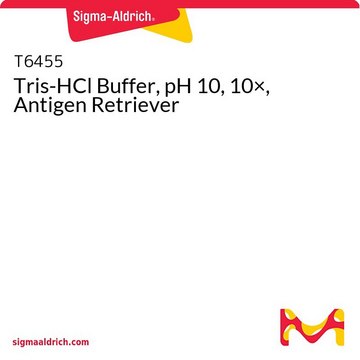T5941
Trizma® hydrochloride
BioPerformance Certified, suitable for cell culture, ≥99.0% (titration)
Synonym(s):
TRIS HCl, TRIS hydrochloride, Tris(hydroxymethyl)aminomethane hydrochloride, Tromethane hydrochloride
About This Item
Recommended Products
Quality Level
grade
BioPerformance Certified
Assay
≥99.0% (titration)
form
crystalline powder
technique(s)
DNA purification: suitable
cell culture | mammalian: suitable
electrophoresis: suitable
protein extraction: suitable
impurities
DNAse, Exonuclease; NICKase, Endonuclease; RNAse and Protease, none detected
endotoxin and total aerobic microbial count, tested
≤0.5% water (Karl Fischer)
color
white
useful pH range
7.0-9.0
pKa (25 °C)
8.1
mp
150-152 °C
solubility
H2O: 667 mg/mL
density
1.39 g/cm3 at 20—25 °C
1.40 g/cm3 at 20—25 °C
absorption
≤0.05 at 290 at 40%
suitability
suitable for electrophoresis
suitable for immunohistochemistry
suitable for molecular biology
application(s)
diagnostic assay manufacturing
general analytical
life science and biopharma
sample preparation
SMILES string
Cl.NC(CO)(CO)CO
InChI
1S/C4H11NO3.ClH/c5-4(1-6,2-7)3-8;/h6-8H,1-3,5H2;1H
InChI key
QKNYBSVHEMOAJP-UHFFFAOYSA-N
Looking for similar products? Visit Product Comparison Guide
General description
Tris buffers are indispensable in techniques like protein electrophoresis and western blotting. In many western blot protocols, a low ionic strength Tris buffer is employed for protein transfer. The transfer duration depends on the blotting apparatus and the size range of peptides under investigation. Tris-based buffers are also commonly used in SDS-PAGE gels, running buffers, and blotting buffers.
Furthermore, Tris salts find extensive use in DNA agarose electrophoresis, particularly in the preparation of buffers like TAE (Tris acetate/EDTA) and TBE (Tris borate/EDTA). These buffers play a pivotal role in various applications, including biochemistry, protein purification, and electrophoresis. Tris HCl is a versatile and essential for maintaining the pH of biological systems and ensuring the optimal performance of biochemical, cell culture, and molecular biology techniques.
Application
- as a washing and rinsing buffer in an immunohistochemical analysis(1)
- as a component of reducing sample buffer, lysis buffer and elution buffer, in a biochemical research involving gel electrophoresis and BioLayer interferometry measurement(2)
Features and Benefits
- Suitable for Molecular Biology and Cell Culture
- Can be used as a Buffer component, for Electrophoresis and Protein separation
- Tested for Endotoxins and Total Aerobic Microbial Count
- Free from DNase, NICKase, RNase, and Protease
- Tested to confirm low levels of heavy metal contamination, ensuring suitability for various applications
- Effective Buffering from pH 7-9 (25 °C) with a pKa of 8.1 (25 °C)
- Highly soluble in water
Packaging
Each kit contains 3 x 100G samples, each sample from a uniquely manufactured lot.
Other Notes
Legal Information
comparable product
Storage Class Code
11 - Combustible Solids
WGK
WGK 3
Flash Point(F)
Not applicable
Flash Point(C)
Not applicable
Personal Protective Equipment
Certificates of Analysis (COA)
Search for Certificates of Analysis (COA) by entering the products Lot/Batch Number. Lot and Batch Numbers can be found on a product’s label following the words ‘Lot’ or ‘Batch’.
Already Own This Product?
Find documentation for the products that you have recently purchased in the Document Library.
Customers Also Viewed
Protocols
Selection of Poly(A)+ RNA by Oligo(dT)-Cellulose Chromatography
Membrane-based blotting applications that employ enzyme conjugates to generate colorimetric or chemiluminescent signal require the use of an added blocking step to decrease the signal generated by non-specific binding.
Preparation of Plasmid DNA by Alkaline Lysis with SDS: Maxipreparation between Cold Spring Harbor Laboratory Press and our research team.
In Situ Hybridization of Whole-Mount Mouse Embryos with RNA Probes: Hybridization, Washes, and Histochemistry. This is a protocol describing how to perform in situ hybridization on whole mouse embryos. Here we describe the hybridization procedure, and the localization of the DIG-labeled RNA using a conjugate of anti-DIG Fab antibody and calf intestinal alkaline phosphatase. Enzyme activity of the reporter is detected by a color reaction, resulting in the formation of a water-insoluble purple/blue precipitate. Manipulating the Mouse Embryo - Third Edition
Our team of scientists has experience in all areas of research including Life Science, Material Science, Chemical Synthesis, Chromatography, Analytical and many others.
Contact Technical Service



